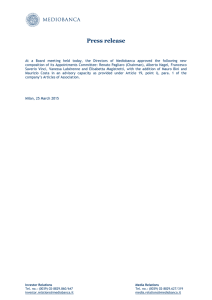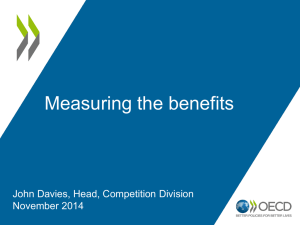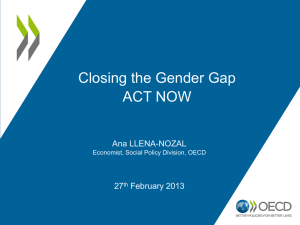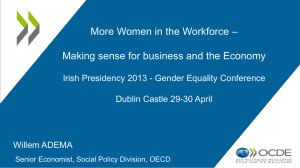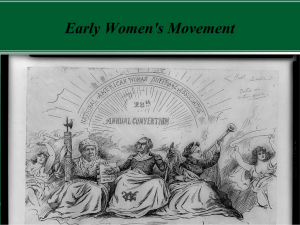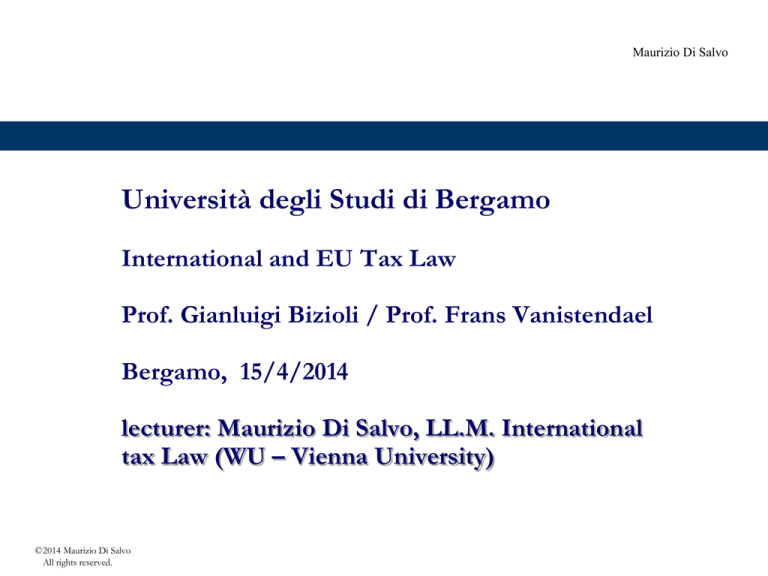
Maurizio Di Salvo
Università degli Studi di Bergamo
International and EU Tax Law
Prof. Gianluigi Bizioli / Prof. Frans Vanistendael
Bergamo, 15/4/2014
lecturer: Maurizio Di Salvo, LL.M. International
tax Law (WU – Vienna University)
©2014 Maurizio Di Salvo
All rights reserved.
Maurizio Di Salvo
Università degli Studi di Bergamo
International and EU Tax Law
Prof. Gianluigi Bizioli / Prof. Frans Vanistendael
Bergamo, 15/4/2014
Exchange of tax information and Mutual
assistance in International tax law
lecturer: Maurizio Di Salvo, LL.M. International tax Law (WU – Vienna
University)
©2014 Maurizio Di Salvo
All rights reserved.
Maurizio Di Salvo
Introduction
•Basic principles
•Legal basis
•Information exchange based on DTA’s
•Information exchange based on Convention on
Mutual Assistance in Tax Matters
•TIEA’s
•EOI: Limits and procedures
•Tax collection through administrative assistance and at
source
• BEPS: Action plan and needs of transparency
•Conclusion
© 2014 Maurizio Di Salvo
All rights reserved.
3
Maurizio Di Salvo
Exchange of tax information (“EOI”): basic principles
1. discrepancy between material universality and
formal territoriality has increased the demand for
efficient international tax cooperation
(globalisation/digital economies);
2. “international tax cooperation” deals with the
matter of assistance between different States of the
international community in the allocation of the
reciprocal tax powers;
3. two condition to be met: (i) the presence of
international (bilateral or multilateral) agreements
between States (ii) the implementation and the
integration of such rules in domestic laws
© 2014 Maurizio Di Salvo
All rights reserved.
4
Maurizio Di Salvo
Assistance in tax collection between different States: basics
1. Territoriality principle: one State can legislate and
enforce its legislation within its territory.
Territoriality principle neither restricts the
possibility of States to tax facts that take place
abroad nor are States limited to taxing nationals or
residents (i.e. to tax non residents);
2. But any action of a State to enforce the tax
payment outside its frontiers may constitute an
intrusion on the sovereignty in the other State
3. Unless the other State, in a bilateral or in a
multilateral treaty, has consented.
© 2014 Maurizio Di Salvo
All rights reserved.
5
Maurizio Di Salvo
EOI and Assistance in tax collection between different States:
legal basis in international tax law
Bilateral
Treaties (OECD Model, UN Model);
TIEA (OECD Model Agreement on Exchange
of Information on Tax Matters );
OECD MC 1981 (Model Convention for Mutual
administrative assistance in recovery taxes)
Multilateral
Multilateral Conventions (1988 Joint Convention
of Mutual administrative assistance in Tax
Matters – OECD and Council of Europe)
Multilateral agreements (Nordic Assistance
Agreement in Tax Matters)
Domestic legislation (which allows
EOI on unilateral basis)
FACTA, Rubik agreements
Each instrument provides different options for tax cooperation and tax
collection
© 2014 Maurizio Di Salvo
All rights reserved.
6
Maurizio Di Salvo
Model Tax Convention/: exchange of information and mutual
assistance in tax collection – (1)
1. Scopes: Not only to avoid double taxation but also
to (i) ensure a correct application of international
and domestic tax rules and (ii) counter tax evasion
and frauds
2.
“There are good grounds for including in a convention for the avoidance of double taxation
provisions concerning co-operation between the tax administrations of the two Contracting
States. In the first place it appears to be desirable to give administrative assistance for the
purpose of ascertaining facts in relation to which the rules of the convention are to be applied.
Moreover, in view of the increasing internationalization of economic relations, the Contracting
States have a growing interest in the reciprocal supply of information on the basis of which
domestic taxation laws have to be administered, even if there is no question of the application
of any particular article of the Convention”
(2010) OECD Commentary on Model Tax convention page 397
© 2014 Maurizio Di Salvo
All rights reserved.
7
Maurizio Di Salvo
Model Tax Convention/: exchange of information and mutual
assistance in tax collection – (2)
1. Scopes: Not only to avoid double taxation but also
to ensure that States provide each other assistance
in the collection of taxes “to the extent needed to ensure
that any exemption or reduced rate of tax granted under this
Convention shall not be enjoyed by persons not entitled to such
benefits” (art. 27 OECD MTC)
1.
“ Assistance must (..) be provided as regards a revenue claim owed to a Contracting State
by any person, whether or not a resident of a Contracting State”
(2010) OECD Commentary on Model Tax convention page 412
© 2014 Maurizio Di Salvo
All rights reserved.
8
Maurizio Di Salvo
EOI/Mutual assistance - the effects of the financial crisis
Financial crisis/global economy: countries realized urgent need of new source
of revenues/increase of efforts to collect revenue/fight tax evasion
1. EOI – Mutual assistance in tax collection: OECD level (bilateral agreement – art.
26/27 MC) and multilateral agreements;
2. EOI: bilateral agreements (Tax Information Exchange Agreement);
3. EOI: European level (EU Savings Directive – Council Directive 2011/16/EU);
4. EOI - Mutual assistance in tax collection: US FACTA - Swiss “Rubik
agreement”;
5. EOI: OECD Standards for automatic exchange of financial account information
© 2014 Maurizio Di Salvo
All rights reserved.
9
Maurizio Di Salvo
Treaties: Information exchange based on DTA’s
OECD MT convention – art. 26 – updated on 2012
The competent authorities of the Contracting States
shall exchange such information as is foreseeably relevant
for carrying out the provisions of this Convention or to
the administration or enforcement of the domestic laws
concerning taxes of every kind and description imposed
on behalf of the Contracting States, or of their political
subdivisions or local authorities, insofar as the taxation
thereunder is not contrary to the Convention. The
exchange of information is not restricted by Articles 1
and 2.
Art. 26 of UN Model is essentially the same of art. 26 of OECD MT Convention
© 2014 Maurizio Di Salvo
All rights reserved.
10
Maurizio Di Salvo
Information exchange based on DTA’s – in practice
Country A
Country B
Ministry of Finance
Ministry of Finance
Competent
Authority
Exchange of
information
Local & regional
Tax officials
© 2014 Maurizio Di Salvo
All rights reserved.
Competent
Authority
Local & regional
Tax officials
11
Maurizio Di Salvo
Treaties : OECD Model Tax Convention – art 26 – “narrow”
and “broad cooperation”
The competent authorities of each contracting State
have the duty to exchange any information, without
being subject to the Model’s subjective or objective
limits derived from Arts. 1 and 2 of MC, as is
foreseeably relevant to secure the correct application:
1. of the provisions of the Convention: this would
mean “narrow cooperation” concerning the
enforcement of the respective treaty;
2. or (also) of the domestic laws of the contracting
States: this would mean, instead, a “broad cooperation”
© 2014 Maurizio Di Salvo
All rights reserved.
12
Maurizio Di Salvo
OECD Model Tax Convention – art 26 – foreseeable relevance
(1)
OECD Commentary 2012 Model Tax Convention on
Income and on Capital on art. 26, page 5.
Foreseeable relevance implies:
1. The reasonable possibility that the requested
information will be relevant at time the requested is
made;
2. That the contracting States are not free to engage a
fishing expeditions;
© 2014 Maurizio Di Salvo
All rights reserved.
13
Maurizio Di Salvo
OECD Model Tax Convention – art 26 – foreseeable relevance
(2)
Foreseeable relevance implies:
3. That the request is not to be considered as fishing
expeditions solely because it doesn’t contain the name or the
address – or both – of the taxpayer under examination or
investigation, or because such names are spelt
differently or in the wrong format.
Fishing expeditions are not authorized but all foreseeable relevant information must be provided,
including bank information and information held by fiduciaries, regardless of the existence of a
domestic tax interest or the application of a dual criminality standard
OECD Global Forum Assessors Handbook (2nd Ed.): “Implementing the Tax Transparency Standards
© 2014 Maurizio Di Salvo
All rights reserved.
14
Maurizio Di Salvo
Treaties : OECD Model Tax Convention – art 26 – Definition
of information
“information” means any fact, statement or record in
any form whatever”
OECD Commentary on the definition of information:
“information”. The definition is very broad and includes any fact, statement or record in any form
whatever. “Record” includes (but is not limited to): an account, an agreement, a book, a chart, a
table, a diagram, a form, an image, an invoice, a letter, a map, a memorandum, a plan, a return, a
telegram and a voucher. The term “record’ is not limited to information maintained in paper form but
includes information maintained in electronic form.
© 2014 Maurizio Di Salvo
All rights reserved.
15
Maurizio Di Salvo
Treaties : OECD Model Tax Convention – art 26 – Types of
information exchange and tax cooperation
Information Exchange
1.
2.
3.
4.
5.
6.
Exchange of Information on request (Specific);
Spontaneous exchange of information;
Automatic (or routine) exchange of information;
Industry-wide exchange of information;
Simultaneous tax examinations;
Tax examinations abroad
Tax Cooperation:
1.
Tax collection (“The matter of administrative assistance for the purpose of tax collection
is dealt with in Article 27, but exchanges of information for the purpose of tax collection are
governed by Article 26 (see paragraph 5 of the Commentary on Article 27)…”).
(2010 updated 2012) OECD Commentary on Model Tax convention page 2
© 2014 Maurizio Di Salvo
All rights reserved.
16
Maurizio Di Salvo
Treaties : OECD Model Tax Convention – art 26 – Exchange
of information on request/spontaneous/automatic (1)
1.
On request: the competent authority of one country asks
for particular information from the competent authority of
another contracting party;
2. Spontaneous: implies the provision of information to
another contracting party that is foreseeable relevant to that
other party and that has not been previously requested;
3. Automatic: involves the systematic and periodic
transmission of “bulk” taxpayer information by the source
country to the residency country concerning various
categories of income (e.g. dividends, interest, royalties,
salaries pensions, etc.);
© 2014 Maurizio Di Salvo
All rights reserved.
17
Maurizio Di Salvo
Treaties : OECD Model Tax Convention – art 26 – Exchange
of information industry wide/spontaneous/tax examinations
abroad (2)
4. Industry wide: the exchange of tax information specifically
concerning a whole economic sector and not taxpayers in
particular;
5. Spontaneous: an arrangement by two or more countries to
examine simultaneously and independently, each on its
territory, the tax affairs of taxpayers (or a taxpayer) in which
they have a common or related interest;
6. Tax examinations abroad:. allows tax administrations,
when requested and to the extent allowable by domestic law,
to permit authorised tax officials of another country to
participate in the conduct of tax examinations carried out by
the requested country.
© 2014 Maurizio Di Salvo
All rights reserved.
18
Maurizio Di Salvo
Multilateral conventions: Information exchange based on
Convention on Mutual Assistance in Tax Matters 1988-2010
Global economy
On 25 January 1988 the OECD and Council of Europe
approved the Multilateral convention on Mutual
assistance in Tax Matters, entered into force in 1 January
2005.
On 2010 a protocol amending the Multilateral Convention was opened with the specific aim of
aligning the Convention to the international standards of bank information on request.
© 2014 Maurizio Di Salvo
All rights reserved.
19
Maurizio Di Salvo
Multilateral conventions: Information exchange based on
Convention on Mutual Assistance in Tax Matters 1988-2010 (2)
Global economy
The objective scope of the Multilateral convention is wider than
in the OECD Model tax convention (taxes on income and profit;
taxes on capital; social security contributions; inheritance tax;
real estate taxes; VAT ).....it seems not limited to tax matters.
The tax information to be exchanged are also relevant when in “preparation of criminal
proceedings in the tax area to be initiated before the judicial bodies”.
© 2014 Maurizio Di Salvo
All rights reserved.
20
Maurizio Di Salvo
Bilateral conventions: TIEA’ s based on 2002 OECD Model
tax agreement on exchange of information (1)
11th September
Form of reaction immediately after the terrorist attacks on 11
September 2001.
The main purpose of the TIEA’s is to promote
international cooperation to counteract tax abuse by the
use of tax havens, especially when there is no tax
treaty between two States (so called “integrated bundle of
bilateral treaties”).
© 2014 Maurizio Di Salvo
All rights reserved.
21
Maurizio Di Salvo
Bilateral conventions: TIEA’ s based on 2002 OECD Model
tax agreement on exchange of information (2)
Financial Crisis:
….“the era of
banking
secrecy is over!!”
The number of TIEA’s increased considerably after
2009 London summit, when G20 decided to fight tax
havens and to increase under pressure the uncooperative
countries.
From 2009 to 2013, many of the black list countries decided to comply with the
transparency standards, in order to obtain the approval of the OECD Peer Review Group,
as created by OECD Global Forum on transparency and EOI for tax purposes.
© 2014 Maurizio Di Salvo
All rights reserved.
22
Maurizio Di Salvo
Exchange of information - Limits (1)
During the exchange of information some limitations
and safeguards are to be respected by Contracting
parties.
No obligation to:
1. Carry out administrative measures at variance with the
laws and administrative practices of either state
(reciprocity);
However, internal provisions concerning tax secrecy should not be interpreted as constituting an obstacle
to the exchange of information under the present Article. As mentioned above, the authorities of the
requesting State are obliged to observe secrecy with regard to information received under this Article.
14.1
(2010 updated 2012) OECD Commentary on Model Tax convention page 13
© 2014 Maurizio Di Salvo
All rights reserved.
23
Maurizio Di Salvo
Exchange of information - Limits (1bis) – Vertical
relationships
During the exchange of information some limitations
and safeguards are to be respected by Contracting
parties.
Some countries’ laws include procedures for notifying the person who provided the information and/or
the taxpayer that is subject to the enquiry prior to the supply of information.
Such notification procedures may be an important aspect of the rights provided under domestic law.
They can help prevent mistakes (e.g., in cases of mistaken identity) and facilitate exchange (by allowing
taxpayers who are notified to co-operate voluntarily with the tax authorities in the requesting State).
Notification procedures should not, however, be applied in a manner that, in the particular
circumstances of the request, would frustrate the efforts of the requesting State.
(2010 updated 2012) OECD Commentary on Model Tax convention page 13
Tax protection of taxpayer
vs/delay in process of
exchanging (Cour de Cassation
31 jan 2012)
© 2014 Maurizio Di Salvo
All rights reserved.
24
Maurizio Di Salvo
Exchange of information - Limits (2)
During the exchange of information some limitations
and safeguards are to be respected by Contracting
parties.
No obligation to:
2. Supply information not obtainable under the laws or
normal course of administration of either state
(exhaustion rule);
© 2014 Maurizio Di Salvo
All rights reserved.
25
Maurizio Di Salvo
Exchange of information - Limits (3)
During the exchange of information some limitations
and safeguards are to be respected by Contracting
parties.
No obligation to:
3. Supply information that would disclose a trade, business
or professional secret etc., or that would be contrary to
“public policy”
Secrets mentioned in this subparagraph should not be taken in too wide a sense.
Before invoking this provision, a Contracting State should carefully weigh if the interests of the
taxpayer really justify its application
(2010 updated 2012) OECD Commentary on Model Tax convention page 13
© 2014 Maurizio Di Salvo
All rights reserved.
26
Maurizio Di Salvo
Exchange of information - Transparency
Efficiency of Exchange of information needs:
Information availability in general
See OECD Manual on the implementation
of EOI for tax purposes
Reliable books and records
See The Joint Ad hoc Group on Accounts
Report approved on 6 July 2005
Beneficial ownership
information/taxpayer
identification
See OECD Harmful tax competition ; An
Emerging Global Issue Report
Access to bank information
See next slide
© 2014 Maurizio Di Salvo
All rights reserved.
27
Maurizio Di Salvo
Exchange of information - Bank Secrecy (1)
Contracting State cannot decline to supply information
solely because the information is held by a bank, other
financial institution, nominee or person acting in an
agency or a fiduciary capacity or because it relates to
ownership interests in a person
Paragraph 5 of art. 26 of OECD Model tax Convention is
intended to grant that the limitations of paragraph 3
(business secrecy) cannot be used to prevent the exchange of
information held by financial institutions;
Accordingly, art. 5 paragraph 4 TIEA’s focused on standards
on EOI as set out in the 2000 Report “Improving Access to Bank
Information for Tax purposes”;
© 2014 Maurizio Di Salvo
All rights reserved.
28
Maurizio Di Salvo
Exchange of information - Effectiveness – towards standards
for automatic exchange of financial account information
At OECD level (but also in the EU and during G20
summit) it was often highlighted the insufficient
effectiveness of international mechanism of EOI.
Remedies:
June 2013: “A step change in tax transparency report”;
September 2013: St. Petersburg G20 Summit endorsed the
OECD proposal for a standard in automatic exchange of
financial account info;
22-23 February 2014: OECD standard for automatic exchange of
financial account information (which introduces Model CAA and
Common reporting and due diligence standards for financial
institutions)
© 2014 Maurizio Di Salvo
All rights reserved.
29
Maurizio Di Salvo
Exchange of information - Procedures
At OECD level, the information exchanged – in
application of international tax secrecy principle – could
only be used by the Authorities involved with the
assessment or with the collection of taxes covered by
OECD MC/TIEA
The recent amendments on 2012 of art. 26 OECD MC
allows the information received to be used also for non
tax purposes (e.g. to counteract money laundering,
corruption, terrorism financing) when:
1.
2.
The information may be used for other purposes under the laws of both States;
The competent authority of supplying State consent such use
© 2014 Maurizio Di Salvo
All rights reserved.
30
Maurizio Di Salvo
Mutual cooperation – the collection of taxes with the assistance
of other countries - OECD MT convention – art. 27
The Contracting States shall lend assistance to each
other in the collection of revenue claims.
This assistance is not restricted by Articles 1 and 2.
The competent authorities of the Contracting States
may by mutual agreement settle the mode of
application of this Article.
© 2014 Maurizio Di Salvo
All rights reserved.
31
Maurizio Di Salvo
Mutual cooperation – the collection of taxes with the assistance
of other countries - OECD MT convention – art. 27
Contracting States shall lend assistance
Assistance not limited to residents of either state or to
the taxes covered by the Convention
Example
A taxpayer owes taxes to Country A and is a resident of Country B, taxes cannot
be recovered in Country A, there are no assets in Country B.
The taxpayer works and receives wages from a company in country C.
If there is an agreement allowing assistance in tax collection between A and C, A
can ask C for assistance in collection by means of a withholding of wages
© 2014 Maurizio Di Salvo
All rights reserved.
32
Maurizio Di Salvo
Mutual cooperation – OECD MT convention – art. 27
paragraph 3 (condition to be met)
Conditions for making a request of administrative
assistance under art. 27:
1. The revenue claim has to be enforceable under the
laws of the applicant State;
2. The revenue claim is owed by a person who, at that
time, cannot, under the law of the applicant state,
prevent its collection;
3. revenue claim normally covers the originally
assessed tax, accrued interest, fines, penalties and
costs
© 2014 Maurizio Di Salvo
All rights reserved.
33
Maurizio Di Salvo
Mutual cooperation – OECD MT convention – art. 27
The requested state can take measures of conservancy
even if the revenue claim is not yet enforceable or when
the debtor still has the right to prevent collection.
Taxpayer may not challenge the existence, validity or
amount of the claim in front of the courts or
administrative bodies of the requested state.
No obligation for the requested state to:
1. Carry out measures at variance with the laws or practices of either state;
2. Carry out measures contrary to public policy;
3. Provide assistance if the applicant state has not pursued all reasonable
domestic measures;
4. Provide assistance where the administrative burden is disproportionate to the
benefit
© 2014 Maurizio Di Salvo
All rights reserved.
34
Maurizio Di Salvo
Tax collection at source – definition
OECD Glossary of tax terms: a third party (WHT agent) is
charged with the task of deducting the tax from certain kinds of
payments and remitting that amount to the Government.
To motivate the WHT agent to whithold and pay regularly
the tax it is held liable for the tax
In international context, tax collection at source, i.e.
withholding tax in bi- or multilateral (cross border) cases,
is an instrument to implement the allocation of
taxing powers.
© 2014 Maurizio Di Salvo
All rights reserved.
35
Maurizio Di Salvo
Tax collection at source – models (E.g. and ref in the MTC)
Income from employment
Art. 15
Income from pensions
Art. 18
Income from dividends
Art. 10
Income from interest
Art. 11
Income from royalties
Art. 12
Business Income
Art. 7
Income from private investments
Art. 21
© 2014 Maurizio Di Salvo
All rights reserved.
36
Maurizio Di Salvo
Tax collection at source – New models - FACTA
The Foreign Account Tax Compliance Act became
operational on 1 Jan 2013 and deals with the tax reporting
of assets held in foreign bank accounts.
FACTA requires foreign financial institution to report directly to US Internal Revenue
Service (IRS) information about financial account held by US taxpayers or foreign entities in
which US taxpayers hold a substantial ownership interest.
Foreign financial institutions are expected to report their findings to the IRS, thereby
preventing US persons from hiding income and assets overseas:
1. US persons with accounts abroad are expected to provide the foreign financial institution
with FACTA required documentation: otherwise, they will be deemed non compliant and
the FFI will be obliged to apply 30% WHT on any “witholdable payment”;
2. If FFI fails to comply with FACTA, it will be subject to a 30% WHT on any “witholdable
payment” made to its proprietary account.
© 2014 Maurizio Di Salvo
All rights reserved.
37
Maurizio Di Salvo
Tax collection at source – New models – Rubik Agreement
Rubik agreements were concluded with the
UK (2011), and Austria (2013).
The objective is to provide for bilateral cooperation between the two countries to ensure
effective taxation (in UK or in Austria) of individuals with financial assets in Switzerland.
The agreement implements a final WHT on (UK or Austria)’s taxpayer future investment
income, gains on assets and their previously untaxed assets in Switzerland.
Account and asset holders have the choice of their identity, assets and income:
1. Being disclosed to the tax authorities of their residence state (voluntary disclosure);
2. Paying anonymously, without disclosure of their identity, a one off levy with regard to the
past investments and a final WHT with regard to present and future income and gains.
The Swiss Rubik take a different approach to international
cooperation in tax matters.
© 2014 Maurizio Di Salvo
All rights reserved.
38
Maurizio Di Salvo
BEPS; see http://www.oecd.org/tax/beps.htm
Addressing Base Erosion
and Profit Shifting
Action Plan on Base
Erosion and Profit Shifting
Base erosion constitutes a
serious risk to tax
revenues, tax sovereignty
and tax fairness for OECD
member countries and
non-members alike. The
G20 has welcomed the
work that the OECD is
undertaking ???
© 2014 Maurizio Di Salvo
All rights reserved.
Action plan should provide
countries with domestic
and international
instruments that will
better align rights to tax
with economic activity.
15 ACTIONS
39
Maurizio Di Salvo
BEPS: action plan
1. Address the tax challenges of the digital
economy
2. Neutralise the effects of hybrid mismatch
arrangements
3. Strengthen CFC rules
4. Limit base erosion via interest deductions
and other financial payments
5. Counter harmful tax practices more
effectively, taking into account transparency
and substance
6. Prevent treaty abuse
7. Prevent the artificial avoidance of PE
status
8, 9, 10 Assure that TP outcomes are in line
with value creation
11. Establish methodologies to collect and
analyse data on BEPS and the actions to
address it
12. Require taxpayers to disclosure their
aggressive tax planning arrangements
13. Re-examine transfer pricing
documentation
14. Make dispute resolution mechanisms
more effective
15. Develop a multilateral instrument
© 2014 Maurizio Di Salvo
All rights reserved.
40
Maurizio Di Salvo
BEPS: action plan live webcast 23 January 2014
© 2014 Maurizio Di Salvo
All rights reserved.
41
Maurizio Di Salvo
BEPS: action plan live webcast 23 January 2014
The digital economy
© 2014 Maurizio Di Salvo
All rights reserved.
42
Maurizio Di Salvo
Conclusion: EOI and cross border collection after (i) OECD
Common standard for automatic exchange of financial account
and (ii) after BEPS
The traditional tax information measures in revenue collected are
weak;
A significant success in the implementation of such measures
requires much closer cross border cooperation between tax
administrations: the tax evaders are even one step ahead;
The Automatic standard for automatic exchange of financial data is
a more effective tool to counter tax evasion;
To avoid the shifting of profits to tax havens urge the latter to sign
treaties with all other countries through a comprensive multilateral
agreement (see the holistic approach of Action plan in the 2013 OECD
BEPS)
© 2014 Maurizio Di Salvo
All rights reserved.
43
Maurizio Di Salvo
BIBLIOGRAPY
Lang, Introduction to the Law of Double Taxation Conventions (Vienna: Linde, 2013);
Maurizio Di Salvo, “Exchange of information as an intrument to counter abuse” in Limits
to Tax Planning, (Vienna: LINDE, 2013);
Brigitte Leitgeb, “Tax collection at source and through adminstrative assistance ” in Limits
to Tax Planning, (Vienna: LINDE, 2013);
OECD Model Tax Convention on Income and on Capital (Paris: OECD, 2010);
OECD “Manual on the implementation of exchange of information provisions for tax purposes” (Paris:
2006);
OECD “Update to the Article 26 of the OECD Model Tax Convention and its Commentary” (Paris:
2012);
OECD Global Forum Assessors Handbook (2nd Ed.): “Implementing the Tax Transparency
Standards
© 2014 Maurizio Di Salvo
All rights reserved.
44
Maurizio Di Salvo
GRAZIE!
Maurizio Di Salvo
Tax Lawyer and CPA (Dottore Commercialista)
LL.M. in International Tax Law (WU – Vienna University)
c/o Studio Vergallo, Brivio & Associati
Via Andrea Solari n. 12, Milan (Italy)
Lecturer of International and EU Tax Law Università degli Studi di Bergamo
Tel. +39 02875406, Fax + 39 0280503481,
Mail: disalvo@vbea.it
© 2014 Maurizio Di Salvo
All rights reserved.
45



